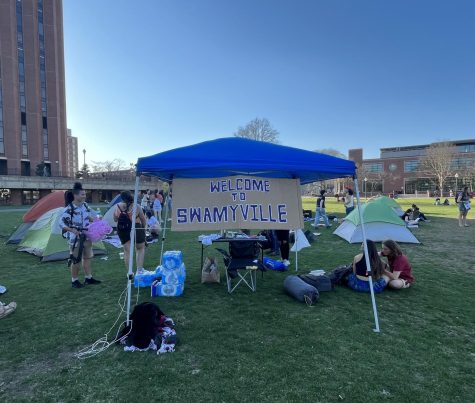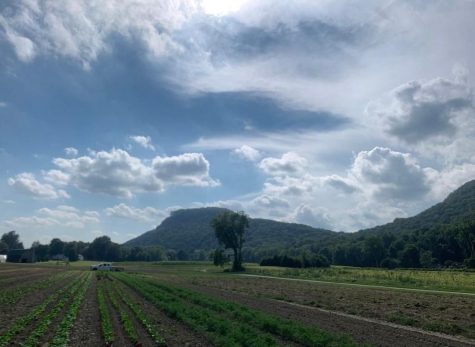Standing in solidarity with Standing Rock Sioux: Local protesters oppose pipeline
Protesters line Amherst streets to denounce Dakota Access Pipeline

More stories from Bryan Bowman
Dozens of people lined the streets in the center of Amherst Tuesday evening, standing in solidarity with the Native American tribe at the center of a fiery protest against a pipeline set to cut through much of the Midwest.
The Standing Rock Sioux Tribe of North Dakota, indigenous to the Midwest, has gained national attention for fighting the construction of the controversial Dakota Access Pipeline. The tribe has been gathering near Cannon Ball, North Dakota since early April.
The Standing Rock Sioux have joined forces with more than 200 tribes and countless environmental activists in the months-long protest against the construction of the pipeline.
The US Army Corps of Engineers approved the $3.7 billion pipeline proposed by Energy Transfer Partners, a Texas-based fossil fuel corporation, earlier this year. Construction of the pipeline was temporarily halted by the Obama administration Friday, but the future of the project remains uncertain.
The Amherst demonstration was organized by local activists Steven Botkin and Ange DiBenedetto. It was sparked by the national day of action called for by activists who organize under the hashtag #NoDAPL.
Botkin and DiBenedetto spread the word through social networks like Facebook and drew a crowd of some 70 people. The protesters lined the intersection between Main Street, Amity Street and South Pleasant Street, holding signs and waving as cars beeped in support.
“We didn’t know if it was just going to be the two of us,” Botkin said with a chuckle. “But I think the size of the crowd shows that this issue speaks to something deep in many of us, and we want to send a message to the people in North Dakota that we are all connected by this, and you are not alone.”
If the project is brought to fruition, the pipeline would span 1,170 miles from North Dakota to Illinois and carry 4,700 barrels of crude oil a day. Protesters say the pipeline disturbs Native American burial grounds and threatens the drinking water in that area.
The demonstration in Amherst comes after violent clashes broke out last week between protesters and security guards near the Standing Rock Reservation in North Dakota.
Several demonstrators in that state were injured when they were attacked by dogs that belonged to security guards at the protest.
North Dakota has filed trespassing charges against journalist Amy Goodman of Democracy Now, who videotaped the incident. Additionally, Green Party presidential candidate Jill Stein may soon face charges for spray painting construction equipment during the protests.
Paulette Steeves, who attended the demonstration in Amherst, is a descendent of the Cree Metis tribe and director of Native American studies at UMass Amherst. Steeves said she believes the concerns of the Standing Rock Sioux over the water supply are legitimate ones, citing previous pipeline bursts in the country that had devastating environmental consequences.
“We can’t just keep subjecting the land to these types of toxins,” Steeves said. “It’s just not right to be threatening the water supply of a reservation like this against their will.”
Divest UMass, the student organization that held demonstrations last spring calling for the university to pull its direct investments in the fossil fuel industry, encouraged members to attend the protest Tuesday.
“We stand in solidarity with the Standing Rock Lakota nation and other allies organizing against the Dakota Access Pipeline which threatens their sacred land, water, health, and safety,” said Divest UMass spokeswoman Mica Reel.
According to Reel, the group believes the pipeline would violate the tribe’s “intrinsic human rights to live in a safe and healthy environment.”
Robert Kerns, a sophomore environmental science major, also attended the protest Tuesday. Kerns said he believes it is “extremely important to stand with our brothers and sisters in North Dakota.”
According to Kerns, the only way to stop powerful corporations like Energy Transfer Partners is with overwhelming numbers.
Vermont Senator and former presidential candidate Bernie Sanders voiced his opposition to the Dakota Access Pipeline Tuesday, proposing a new amendment in the Senate that would prevent the federal government from allowing Energy Transfer Partners to continue construction until the completion of an environmental impact analysis of the 1,170-mile zone the pipeline is set to travel through.
Despite the mounting protest and growing opposition, Energy Transfer Partners CEO Kelcy Warren vowed to continue the project and defended its environmental safety. According to Warren, nearly half of the 1,170-mile pipeline has already been completed.
Bryan Bowman can be reached at [email protected], or follow him on Twitter @BryanBowman14.









